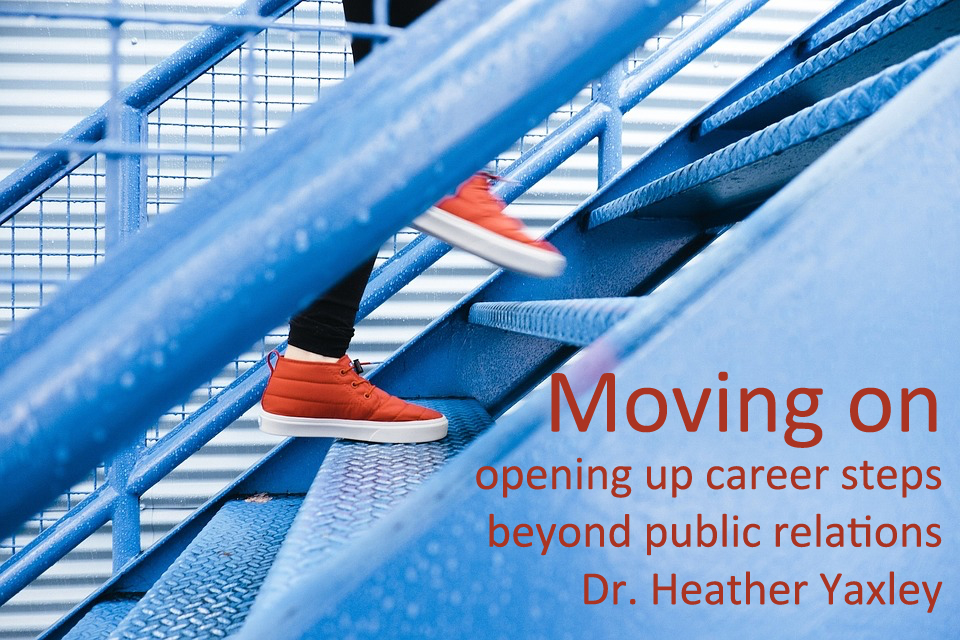Moving on: Career steps beyond public relations

About the author
Heather is a key member of our assessor team. PhD, BSc, PG, RSA, CAM

In a previous feature (Understanding the common causes of career-related stress), I noted that working in public relations helps develop transferable skills. Here, I respond to questions about opening up career paths beyond public relations.
Before working in PR, I was a journalist. Looking forwards, I’m thinking about setting up as an independent writing expert. What are my options?
Plan ahead. Undertake research regarding self-employment and the potential for your business. You can download a useful Starting a business checklist, enrol for a free Starting your small business course with OpenLearn and find lots of helpful resources via Start Up Donut. Put together a business plan, take time to develop your offering and determine a pricing strategy that allows for start-up and on-going costs.
When you feel ready, talk with your employer who may become your first client. Or it may be feasible to set up a new service alongside your current role and work part-time. Decide on your branding and online presence – whether you are going to operate as an individual or build a company. You may also find the new PR freelancer-client matching service, The PR Cavalry, helpful in finding work.
My employer has offered me a chance to undertake an overseas assignment in a general management position, but I love working in my current communications role. What are the pros and cons of this career move?
You are right to consider the risks that may be associated with short-term or project contracts. Be clear about the terms of any secondment regarding future employment, including whether your current role will remain open or if a permanent move is an option. Try to speak with someone who has undertaken a similar move. Remember, there are many positives, including the opportunity to gain new experiences, expand your professional network and enhance your career resumé.
Taking on an assignment in a general management position is an opportunity to reflect on whether this is a path you’d like to pursue, or if your heart lies in developing a specialist comms career.
I’m concerned that specialising in public relations will restrict my professional development. How can I future proof my career?
There’s a saying that generalists know less and less about more and more, while specialists know more and more about less and less. Some careers start out with broad underpinnings before specialising – this professional form is common in medicine for example. In contrast, a military career reflects a bureaucratic form beginning in a specific area before breadth is added when climbing the ranks.
Public relations careers are more entrepreneurial in form and can be crafted in different ways. Finding stability in volatile times is a challenge, but one way you can future proof a career is by focusing on three different aspects. I’ve termed this a Pi-shaped π form. It involves developing two specialisms, most likely in a sector and a discipline, topped by general, transferable competencies. By balancing a set of capabilities, you would maximise your investment in sustainable career development.
Having recently graduated, I’m working in my first role in digital communications. My ambition is to be a managing director of an international brand. When should I start to make career moves?
Whilst it is helpful to have a clear purpose, you also need to be open to opportunities in planning a career – as explained brilliantly by Tove Nordstrom in a recent PR Place post. CIPR sets out a promotional pattern for PR careers indicating a 7-11 year planned progression from junior to head of function. In reality, most people experience job changes in a less ordered way.
Think of your career as a series of beginnings and becomings. Currently you are beginning to develop your skills in digital communications. This gives you an opportunity to become more experienced in that field – and develop your critical thinking and self-awareness (as Marcel Klebba considers in reflecting on his initial career experiences). As that happens, you should look to begin a new career phase by seeking further experience and building on your digital skills perhaps a more general communications role. To achieve your ambitions your career will need to develop in three dimensions: vertical, radial and circumferential.
These correspond to taking on more responsibilities, building a reputation as a trusted advisor and broadening your skillset across other functional areas. As you can see, this is less about counting time to the next career move and more about improving yourself, working with others and thriving on new opportunities.